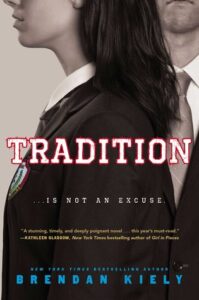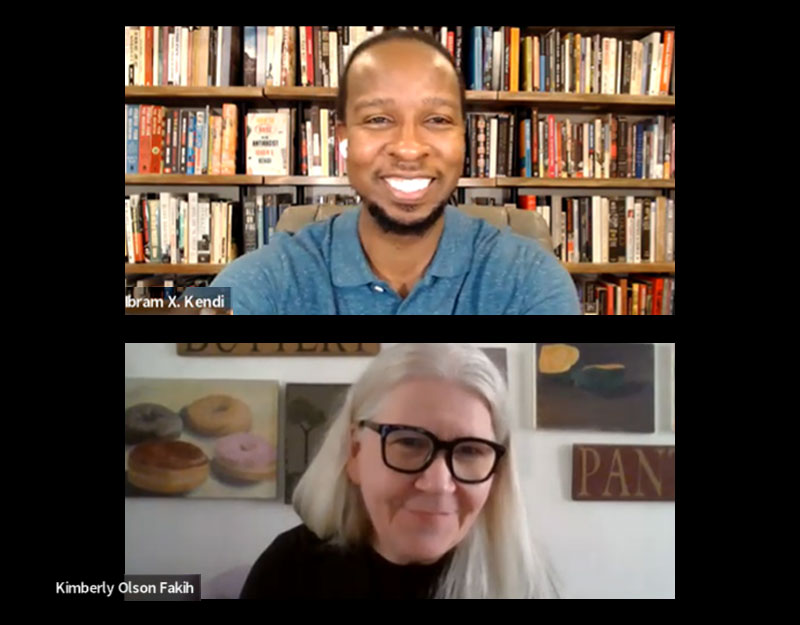Book Review: Examining Toxic Masculinity in TRADITION by Brendan Kiely
Earlier this year, both TLTer Amanda MacGregor and myself wrote posts about toxic masculinity.When we look at large mass shootings, one of the common denominators that keep occurring is that of domestic violence, which is tied in to toxic masculinity. At the most basic, toxic masculinity is defined as:
adherence to traditional male gender roles that restrict the kinds of emotions allowable for boys and men to express, including social expectations that men seek to be dominant (the “alpha male”) and limit their emotional range primarily to expressions of anger. – https://en.wikipedia.org/wiki/Toxic_masculinity
How Boys Suffer: The Boy Code and Toxic Masculinity
Toxic masculinity is a topic that YA author Brendan Kiely takes head on in his upcoming release, TRADITION.
Publisher’s Book Description:
From New York Times bestselling and award-winning author Brendan Kiely, a stunning new novel that explores the insidious nature of tradition at a prestigious boarding school.
Prestigious. Powerful. Privileged. This is Fullbrook Academy, an elite prep school where history looms in the leafy branches over its brick walkways. But some traditions upheld in its hallowed halls are profoundly dangerous.
ADVERTISEMENT
ADVERTISEMENT
Jules Devereux just wants to keep her head down, avoid distractions, and get into the right college, so she can leave Fullbrook and its old-boy social codes behind. She wants freedom, but ex-boyfriends and ex-best friends are determined to keep her in place.
Jamie Baxter feels like an imposter at Fullbrook, but the hockey scholarship that got him in has given him a chance to escape his past and fulfill the dreams of his parents and coaches, whose mantra rings in his ears: Don’t disappoint us.
When Jamie and Jules meet, they recognize in each other a similar instinct for survival, but at a school where girls in the student handbook are rated by their looks, athletes stack hockey pucks in dorm room windows like notches on a bedpost, and school-sponsored dances push first year girls out into the night with senior boys, the stakes for safe sex, real love, and true friendship couldn’t be higher.
As Jules and Jamie’s lives intertwine, and the pressures to play by the rules and remain silent about the school’s secrets intensify, they see Fullbrook for what it really is. That tradition, a word Fullbrook hides behind, can be ugly, even violent. Ultimately, Jules and Jamie are faced with the difficult question: can they stand together against classmates—and an institution—who believe they can do no wrong?
Karen’s Thoughts:
I picked up Tradition solely because it was written by an author I respect. Brendan Kiely worked with us here at TLT earlier for the Sexual Violence in YA Literature project with his book The Gospel of Winter. He also co-authored All American Boy with Jason Reynolds. These are both phenomenal works of literature and I was very much looking forward to Tradition. The timing of this book is, in my opinion, perfect for our culture which is sincerely trying to discuss the issue of toxic masculinity, sexual harassment and violence, and the #metoo movement. I was in no way disappointed by this book. I knew that it would talk about sexual violence, but I was quite surprised by how straight forward it is in tackling the topic of toxic masculinity.
Jamie Baxter is a male athlete who comes from a world that embraces toxic masculinity and is thrown into a new world where it thrives. In his previous school, his views were challenged some by his girlfriend, who made him think about issues such as race and misogyny. But a very violent act makes puts his future in jeopardy and fills him with both self loathing and self doubt. As often happens, everyone in Baxter’s life goes out of his way to give him a second chance. And there is something to be said here about how many chances we give to white men who commit horrific acts as compared to how we respond when marginalized groups, such as people of color or women, commit acts that are deemed socially unacceptable. Now Baxter is thrust into this new world where he must wrestle with who he is and what he has done, but everyone wants to reward him for the very behaviors that have grievously injured another. It is anger most of all that Baxter fights against; this anger inside himself that being on the field seems to heighten. This is a culture that tells boys to “man up” or to “grow a pair.”
Baxter is given a scholarship – class issues and privilege are touched upon in this title as well – to an elite private school, but it means that he has to engage once again in a sport which encourages him to be aggressive in ways he seems to have trouble controlling when immersed in this culture. And to make matters worse, his peers are very privileged young men who wholly embrace toxic masculinity and the many myths that prop it up, including that of the sexual prowess and dominance of men. The female students at this school are seen very much as objects by his teammates and many of the school traditions encourage this treatment of the female population.
When Baxter arrives, he meets Jules. Jules is a feminist out of water in this school – and my hero! She stands in the courtyard handing out flyers for the clinic. She sets a tampon on her desk because she refused to be ashamed of the fact that she menstruates. She challenges the status quo and enlists several friends in her fight against it. These friends include a gay best friend and another outsider who is carrying some very real trauma with her.
The tensions build and the things that you are pretty sure are going to happen do in fact happen. I’m not going to lie, some of these scenes were really hard to read. But then the four friends put together a plan to raise awareness because the system, as it often does, fails them. There are a lot of powerful scenes, discussions and issues packed into this book.
Some of the things that I think that Kiely does especially well are:
He provides a really powerful contrasting sexual scene where consent is very well illustrated to balance scenes where consent is not given. This scene is so powerful and necessary and delicately handles the discussion of consent.
There is a lot of discussion here and some good examples of what it means to be an ally. Baxter takes a lot of risks in both small and big ways to stand up for what he believes his right. And there is a realistic cost to him for doing so.
ADVERTISEMENT
ADVERTISEMENT
Although many characters within the book question what happened to them, which is a normal response to sexual violence, at no time does the reader, which I really think is important.
There is a lot that happens around the word NO in this book and I just found it uplifting to read. Not why it happens, of course, but the ways in which the victims choose to become survivors and to be bold in stating the truth about what happened to them.
This is a strong addition to all collections and in the discussion of both toxic masculinity and sexual violence. It is powerful, challenging, moving, heartbreaking and inspiring. The horror of what happens is boldly proclaimed the true horror that it is. Adults are portrayed in more than one way. The realities of the issues are laid out in no uncertain terms. I highly recommend this as a companion novel to Sex & Violence by Carries Mesrobian for a complex look at toxic masculinity.
I also highly recommend the recent work of Chessy Prout, #IHaveTheRightTo, which is her very real experience of sexual assault at an elite boarding school told in her own words. I think it is very important that we take this fictional narrative written by a male and put it with this real life experience told from a female survivor.
Filed under: Book Reviews
About Karen Jensen, MLS
Karen Jensen has been a Teen Services Librarian for almost 30 years. She created TLT in 2011 and is the co-editor of The Whole Library Handbook: Teen Services with Heather Booth (ALA Editions, 2014).
ADVERTISEMENT
ADVERTISEMENT
SLJ Blog Network
The Moral Dilemma of THE MONSTER AT THE END OF THIS BOOK
Cover Reveal and Q&A: The One and Only Googoosh with Azadeh Westergaard
Winnie-The-Pooh | Review
Parsing Religion in Public Schools
ADVERTISEMENT











If gender is fluid then why code a certain kind of behavior as “masculine” except to antagonize just slightly under half the population? Obnoxious, toxic behavior is just obnoxious, toxic behavior. Period. Full stop.